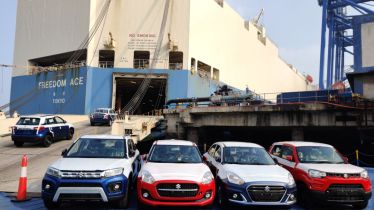Shortage of semiconductors has dented the domestic sales of Maruti Suzuki India but the country’s largest carmaker has seen its exports rise 151% during the April-February period of the current financial year owing to additional supply of chips used in the export models.
Maruti Suzuki India exported a total of 2,11,880 units in the first 11 months of FY22, registering an increase of 150.62% over the year-ago period. It shipped 2,09,487 passenger vehicles and 2,393 light commercial vehicles during the April-February period.
Although Hyundai Motor India, which has led passenger vehicle exports for many years, clocked 28.44% year-on-year growth in shipments to 1,18,573 units during April-February FY22, it is trailing Maruti Suzuki India by 90,914 units.
This is the first occasion when Maruti Suzuki India has crossed the export milestone of 2 lakh units in a financial year. Besides, it posted its highest-ever monthly exports of 24,021 units in February 2022.
“There are different types of chips — export versions and domestic versions. We could not get enough chips of domestic versions. But we could get additional volume of export versions. That is why the volume of exports is increasing,” Kenichi Ayukawa, MD and CEO, Maruti Suzuki India, told FE.
“As the electronic components used in export models are different, somehow, we have been fortunate that our exports were not impacted,” said Rahul Bharti, executive director, corporate affairs, Maruti Suzuki India.
Maruti Suzuki India currently exports 16 different models with Baleno, Dzire, Swift, S-Presso, and Brezza being the top five in terms of volumes. It started exporting S-Presso in January 2020 and Jimny in January 2021. The company’s top export markets include Latin America, ASEAN, Africa, and the Middle East, and it claimed that its volumes have more than doubled in these markets.
According to analysts, in some of the export markets for Maruti Suzuki India, the models sold there are light on features, and hence don’t require chip usage as much as the domestic market where usually feature-loaded cars are sold more.
Bharti said that about two years ago, Maruti Suzuki India decided to mount a strong effort towards a quantum increase in exports.
“With the strong support of our parent, Suzuki Motor Corporation, we worked on all fronts — expand the export product portfolio, reach out to more geographies and expand distributor network,” he added.
Regarding Maruti Suzuki’s export expansion plans, Bharti said that it is an ongoing effort and the company will continue to explore new markets and increase density in existing markets.
The company started exporting vehicles in 1986-87. It reached one million units export milestone in 2012-13 with over 50% of cars sent to developed markets in Europe. It touched cumulative shipments of two million units in 2020-21 with a focus on emerging markets in Latin America, Africa, and Asia.
